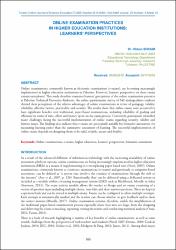Online examination practices in higher education institutions: learners’ perspectives

View/
Access
info:eu-repo/semantics/openAccessAttribution-NonCommercial 3.0 United Stateshttp://creativecommons.org/licenses/by-nc/3.0/us/Date
2019Metadata
Show full item recordCitation
Shraim, K.(2019). Online examination practices in higher education institutions: learners’ perspectives. TOJDE, 20 (4), 185-196.Abstract
Online examinations, commonly known as electronic examinations (e-exams), are becoming increasingly
implemented in higher education institutions in Palestine. However, learners’ perspectives on these exams
remain unexplored. This study therefore examines learners’ perceptions of the online examination practices
at Palestine Technical University-Kadoorie. An online questionnaire survey of 342 undergraduate students
elicited their perceptions of the relative advantages of online examinations in terms of pedagogy, validity,
reliability, affective factors, practicality and security. The results show that online exams were perceived to
have significant benefits over traditional, paper-based examinations, including reliability of grading and
efficiency in terms of time, effort and money spent on the exam process. Conversely, participants identified
many challenges facing the successful implementation of online exams regarding security, validity and
fairness issues. The findings also indicate that e-exams are particularly suitable for formative assessment, for
measuring learning rather than the summative assessment of learning. The successful implementation of
online exams depends on designing them to be valid, reliable, secure and flexible.
Source
Turkish Online Journal of Distance Education-TOJDEVolume
20Issue
4Collections
The following license files are associated with this item:


















